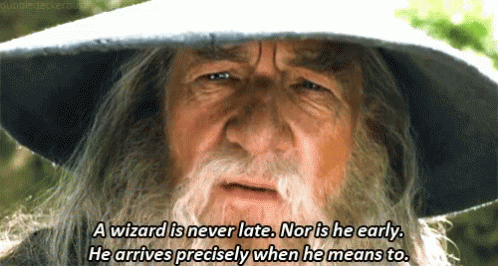As I dust off my shorts and sunglasses, eager to soak in the famous Edinburgh spring, I realise: I must enjoy that sun whilst I can, for the Final Project is waiting to take hold of me from behind the next corner. That is, right after I finish the last few course assessments.
A timely project management has never been a strength of mine. I’d say that most of my life has been governed by a piece of wisdom preceding our age:

This is not a joke, it is something that I believe in, something I found confidence in. My undergraduate creative dissertation project was said to be an engagement spanning the whole academic year. However, the motivating pressure in my body only started overflowing about under a month before the deadline. What followed was 3 weeks of a blissful, intensely productive daily routine, covering work that should have taken me 3 semesters.
Luckily, it didn’t turn into the catastrophic (albeit comical) anecdote described by Tim Urban in his TED talk (below). In fact, the work won the faculty’s Best Dissertation award – and I dare to assume that wasn’t just because everyone else in my programme was even a bigger procrastinator than me. I was very happy with the output, even though it created under pressure and in short time.
With that and many other experiences, at university and in work situations, I learned that most of the time, my body knows when it is time to start working, and forcing the work before that will just lead to procrastinated afternoons and disappointed evenings (which I could spend in a better way).
And yet! The scope of this final project feels quite a bit more overwhelming than a standard essay or presentation. And I recognise that this might get me into an uncomfortable position later on, where I’d find myself with too much to do and no clue where to start – leading to a dissatisfactory project, leading to regrets, leading to bitterness.
So, as an attempt to make the project less overwhelming and prevent procrastination (and to tick off a required component for the Project Plan), I put together a desired project timeline.
In an ideal world, this is how I would like the project to go. Most certainly, it won’t. Inevitably, the timings dedicated to the different sub-phases will reveal themselves as overestimated or underestimated. Other work and commitments will take my attention away, sicknesses will happen. Some days the sun will be shining too bright for me to resist taking the day off.
PHASE 1: READING AND CONCEPTUALISING Week 1 (5-11 May): Interacting with my selection of core readings – the "advisory council" of author, books and documents Week 2 (12–18 May): Expanding the reading based on identified gaps – going deeper into more specific disciplinary evidence Week 3 (19–25 May): Creating a guiding framework for the project – concepts, structures and principles to inform the creative process PHASE 2: GAME MAKING Week 4 (26 May–1 June): Reviewing and sorting my accumulated creative ideas to fit the framework – with a degree of iterative adaptation Week 5 (2–8 June): Interacting with existing games on the topic in board game libraries – critical evaluation of best practices and "market gaps" Week 6 (9–15 June): Prototyping in the Makerspace – structurally designing key game components Week 7 (16–22 June): Solo playtesting and rule book drafting – iterative process to determine number of components needed and game scope Week 8 (23–29 June): Further prototyping in the Makerspace – multiplication of game components and variation within component types Week 9 (30 June–6 July): Solo playtesting, rule book drafting and prototyping – iterative process for balancing mechanics and elements Week 10 (7–13 July): Playtesting in informal friend groups – gathering feedback for further balancing, tweaks and fixes Week 11 (14–20 July): Finalising the prototype – a mechanically fully functional board game (with temporary placeholder art and graphic design) BREAK Week 12 (21–27 July): Reflecting on the creative process and post-submission next steps whilst hiking PHASE 3: WRITE-UP Week 13 (28 July–3 August): Sorting and structuring the notes accumulated throughout the research and game making – drafting the commentary Week 14 (4–10 August): Writing up the commentary Week 15 (11–12 August): Final reviews and submission POST-SUBMISSION Unconfirmed (17-24 August): Devcom & Gamescom conference in Germany – finding collaborators for turning the prototype into a marketable game (Autumn '25): Talking to potential publishing/marketing partners (my NGO, UN's #GenerationRestoration, game publishing houses) (Winter '25): Fundraising for the first batch of copies – applying for grants, pitching to investors (Spring '26): Pilot programme at schools – if the game's target use include education
What I need to figure out now:
How do I make myself stick to the timeline?
Few things come to mind that I will try to follow through on:
- a post-it notes calendar of the timeline on my wall (possibly with an embedded reward system for gamification)
- sharing weekly/daily targets with close people for accountability
- a daily routine that keeps the creative juices flowing and also doesn’t overburden myself (eg. morning swim to boost motivation and reflective writing to unclog the system, having a dedicated Final Project working area – Makerspace? –, finishing work at a consistent time to relax and wind down over a more passive evening activity)
- a weekly calendar that keeps boundaries between time dedicated to the Final Project and my part-time NGO work
But I would also like to hear from my fellow wizards and procrastinators:
What self-discipline hacks can you share? How do we keep each other accountable and productive? Also, in case you ever created a board game, how does my timeline sit with you in terms of being realistic or not?
That’s it for this blog post – off to catch some sun and continue on this, as always, tomorrow…

